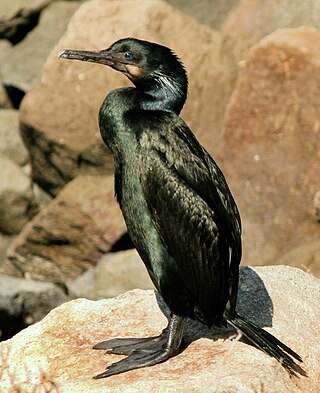
Brandt's cormorant is a strictly marine bird of the cormorant family of seabirds that inhabits the Pacific coast of North America. It ranges, in the summer, from Alaska to the Gulf of California, but the population north of Vancouver Island migrates south during the winter. Its specific name, penicillatus is Latin for a painter's brush, in reference to white plumes on its neck and back during the early breeding season. The common name honors the German naturalist Johann Friedrich von Brandt of the Academy of Sciences at St. Petersburg, who described the species from specimens collected on expeditions to the Pacific during the early 19th century.

The yellow-eared bulbul is a species of songbird in the bulbul family of passerine birds. It is an endemic resident breeder in the highlands of Sri Lanka. The common name is also used as an alternate name for the yellow-throated bulbul.

Ophichthidae is a family of fish in the order Anguilliformes, commonly known as the snake eels. The term "Ophichthidae" comes from Greek ophis ("serpent") and ichthys ("fish"). Snake eels are also burrowing eels. They are named for their physical appearance, as they have long, cylindrical, snake-like bodies. This family is found worldwide in tropical to warm temperate waters. They inhabit a wide range of habitats, from coastal shallows and even rivers, to depths below 800 m (2,600 ft). Most species are bottom dwellers, hiding in mud or sand to capture their prey of crustaceans and small fish, but some are pelagic.

The rabbit rats, genus Conilurus represent an unusual genus of Old World rats from Australia, New Guinea, and Melville Island.

The white-tipped tufted-tailed rat is a rodent endemic to Madagascar. It is known from only two specimens, one collected from Ampitambe forest in 1895 or 1896 and the second in 2000. It is listed by the International Union for Conservation of Nature (IUCN) as an endangered species due to habitat loss.
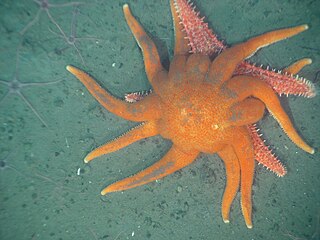
The Valvatida are an order of starfish in the class Asteroidea, which contains 695 species in 172 genera in 17 families.
Chinophrys wuae is a species of jumping spider, named after the collector Hai-Yin Wu. C. wuae is similar to Attulus penicillatus, and is only known from Taiwan.
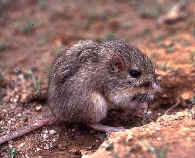
The desert pocket mouse is a North American species of heteromyid rodent found in the southwestern United States and Mexico. True to its common name, the medium-sized desert pocket mouse prefers sandy, sparsely vegetated desert environments.

The brush-tailed rabbit rat is a species of rodent in the family Muridae. It is found in Australia and Papua New Guinea.

Eliurus is a genus of rodent in the family Nesomyidae. It contains the following species:

Medionidus penicillatus, the gulf moccasinshell, is a rare species of freshwater mussel in the family Unionidae, the river mussels. This aquatic bivalve mollusk is native to Alabama, Florida, and Georgia in the United States, where it is in decline and has been extirpated from most of the rivers it once inhabited. It is a federally listed endangered species of the United States.

Hemigrapsus takanoi, the brush-clawed shore crab or Asian shore crab, is a small crab of the family Varunidae that lives on rocky shores surrounding the Pacific Ocean, and which is invasive along the European coastlines. This crab is omnivorous and eats small fish, invertebrates and algae.

Chaetosomatidae is a small family of beetles, in the superfamily Cleroidea. There are three extant genera, two of which are endemic to New Zealand with the other (Malgassochaetus) native to Madagascar. Members of this family are predaceous on wood-boring insects.
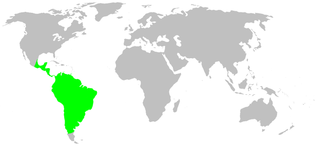
Senoculus is a genus of araneomorph spiders in the family Senoculidae, and was first described by Władysław Taczanowski in 1872. It is the only genus in the family Senoculidae.
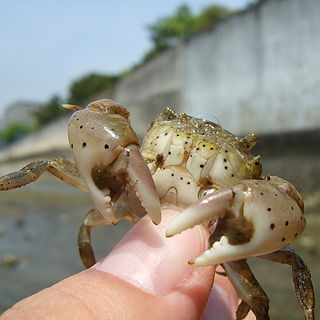
Hemigrapsus penicillatus is a species of crab. The native range of Hemigrapsus penicillatus extends from the Russian Far East along the coasts of Japan, China, Taiwan and Korea, as far south-west as Hong Kong. Although the species was reported from Hawaii in 1903, this is likely to have been an error; there are no recent records of the species in the central Pacific. Reports of H. penicillatus on the coasts of Europe refer to a related species, H. takanoi, which was only distinguished from H. penicillatus in 2005, several years after its discovery in Europe. Hemigrapsus penicillatus lives in the intertidal zone on stony or muddy shores.

Panulirus penicillatus is a species of spiny lobster that lives on shallow rocky and coral reefs in the tropical Indo-Pacific region. Common names for this spiny lobster include variegated crayfish, tufted spiny lobster, spiny lobster, Socorro spiny lobster, red lobster, pronghorn spiny lobster, golden rock lobster, double spined rock lobster and coral cray. It has a very wide range and the International Union for Conservation of Nature has assessed its conservation status as being of "least concern".
This page lists all described species of the spider family Viridasiidae accepted by the World Spider Catalog as of December 2020:

Scolopterus penicillatus, also known as the black spined weevil, is an endemic beetle of New Zealand.

Cyanothamnus penicillatus is a plant in the citrus family, Rutaceae and is endemic to the south-west of Western Australia. It is a low, spreading shrub with pinnate leaves and white flowers with four petals and eight stamens.

Ranunculus penicillatus is a species of flowering plant belonging to the family Ranunculaceae.

















